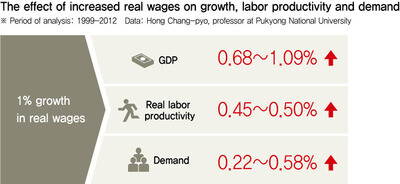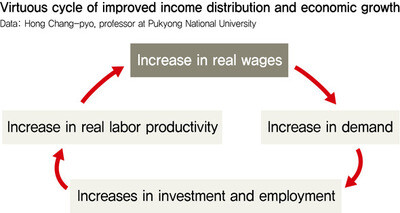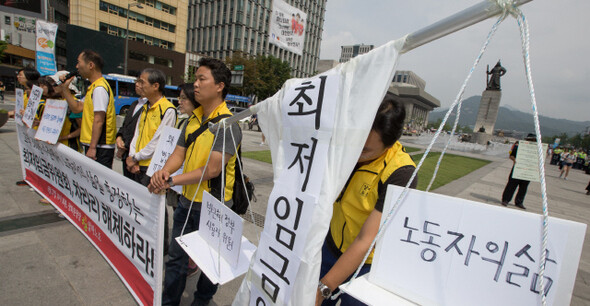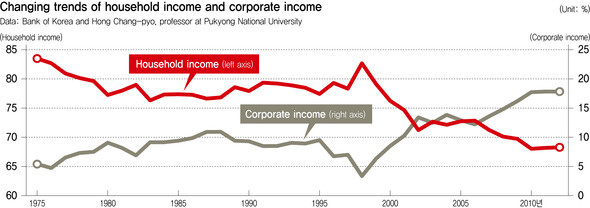hankyoreh
Links to other country sites 다른 나라 사이트 링크
S. Korean economy suffering both low growth and inequality

By Ryu Yi-geun and Kim Kyung-rok, staff reporters
The South Korean economy is drifting into the doldrums of low-growth inequality, with the growth rate falling and inequality increasing. The country’s economic growth rate fell from around 8% before the Asian financial crisis (1987-1997) to 5% afterward (1999-2007). Since 2008, it has dropped to a yearly average of 2%.
With the inflation rate hovering around 1%, there are even concerns that South Korea is starting to resemble the Japanese economy. Since the late 1990s, Japan has been stuck in a trap of low growth and low inflation.

At the same time, income inequality is becoming more severe, as large companies and high wage earners pocket an ever-increasing share of economic growth. The top 10% income segment takes home more than 40% of the country’s total income. South Korean society is approaching the situation of the US, which has the worst inequality of any developed country.
Corporate earnings are not trickling down to households. While corporate income has increased by an average of 9.4% each year since the Asian financial crisis (between 1997 and 2012), household income has only gone up by 5.5%. In addition, the tendency for corporate earnings to be tilted toward large companies has gotten worse, with Samsung, Hyundai Motor, and the rest of the top ten groups accounting for more than 60% of the earnings of all listed companies in South Korea.

South Korea today is failing to achieve either economic growth or wealth distribution. As a result, there is growing support for income-led growth, the idea that the only way to increase economic growth is by distributing wealth properly and increasing household income, which have been expected to sacrifice until now. This is the argument that increasing household income through raising wages will lead to more consumption (effective demand) and greater investment, putting in place a virtuous cycle of economic growth.
This contrasts with the model of growth that emphasizes exports and large corporations. Thus far, the government has sought to foster economic growth by keeping wages down and raising corporate earnings to promote investment and exports.
Recently, Choi Kyung-hwan, the nominee for Minister of Strategy and Finance and Vice Prime Minister, who, if his nomination is confirmed, will lead the next economic team for the administration of President Park Geun-hye, recently indicated that he agrees with the idea of stimulating the economy by increasing household income. This is understood as reflecting growing anxiety that the methods of the past are no longer effective in growing the economy.
On July 10, Choi responded to written questions from Park Young-seon, floor leader for the New Politics Alliance for Democracy (NPAD), by saying, “Development in the South Korean economy has been concentrated in the past on exports and the manufacturing industry, but recently, we have been seeing a weakening of growth potential and a slump in household income. I agree with the idea of using an increase in household income to stimulate the economy.”
“We are aware of the problems resulting in the decrease in the labor share. We have also recently asked the Korea Development Institute (KDI) to do some research on the subject,” said a senior official in the Ministry of Strategy and Finance on condition of anonymity. “Labor share” is a term that refers to the percentage of the national income represented by wages.
There is also growing interest among opposition politicians about the idea that economic growth can be fueled by wages. Moon Jae-in and Eun Su-mi, lawmakers for the NPAD, held a seminar in the National Assembly on July 10 titled “Income-Led Growth: What It Means and How to Get There.”

Since the global financial crisis in 2008, discussion of the idea has been taking place among academics and at overseas economic organizations including the International Labour Organization. Among South Korean academics, research on the topic has been published by Hong Chang-pyo, professor at Pukyong National University, among others.
In a recently published paper titled “Functional Distribution of Income and Economic Growth in Korea: Toward an Analysis of Patterns of Demand and Productivity,” Hong argued that, when the real wages of all of South Korea’s workers increase by 1%, the gross domestic product (GDP) increases by 0.68-1.09%.
Please direct questions or comments to [english@hani.co.kr]

Editorial・opinion
![[Column] Park Geun-hye déjà vu in Yoon Suk-yeol [Column] Park Geun-hye déjà vu in Yoon Suk-yeol](https://flexible.img.hani.co.kr/flexible/normal/500/300/imgdb/original/2024/0424/651713945113788.jpg) [Column] Park Geun-hye déjà vu in Yoon Suk-yeol
[Column] Park Geun-hye déjà vu in Yoon Suk-yeol![[Editorial] New weight of N. Korea’s nuclear threats makes dialogue all the more urgent [Editorial] New weight of N. Korea’s nuclear threats makes dialogue all the more urgent](https://flexible.img.hani.co.kr/flexible/normal/500/300/imgdb/original/2024/0424/7317139454662664.jpg) [Editorial] New weight of N. Korea’s nuclear threats makes dialogue all the more urgent
[Editorial] New weight of N. Korea’s nuclear threats makes dialogue all the more urgent- [Guest essay] The real reason Korea’s new right wants to dub Rhee a founding father
- [Column] ‘Choson’: Is it time we start referring to N. Korea in its own terms?
- [Editorial] Japan’s rewriting of history with Korea has gone too far
- [Column] The president’s questionable capacity for dialogue
- [Column] Are chaebol firms just pizza pies for families to divvy up as they please?
- [Column] Has Korea, too, crossed the Rubicon on China?
- [Correspondent’s column] In Japan’s alliance with US, echoes of its past alliances with UK
- [Editorial] Does Yoon think the Korean public is wrong?
Most viewed articles
- 1‘We must say no’: Seoul defense chief on Korean, USFK involvement in hypothetical Taiwan crisis
- 2N. Korean delegation’s trip to Iran shows how Pyongyang is leveraging ties with Moscow
- 3‘Weddingflation’ breaks the bank for Korean couples-to-be
- 4[Column] Park Geun-hye déjà vu in Yoon Suk-yeol
- 5Korea sees more deaths than births for 52nd consecutive month in February
- 6[Guest essay] The real reason Korea’s new right wants to dub Rhee a founding father
- 7[Column] The clock is ticking for Korea’s first lady
- 8[Column] Has Korea, too, crossed the Rubicon on China?
- 9Why Korea shouldn’t welcome Japan’s newly beefed up defense cooperation with US
- 10Will NewJeans end up collateral damage in internal feud at K-pop juggernaut Hybe?